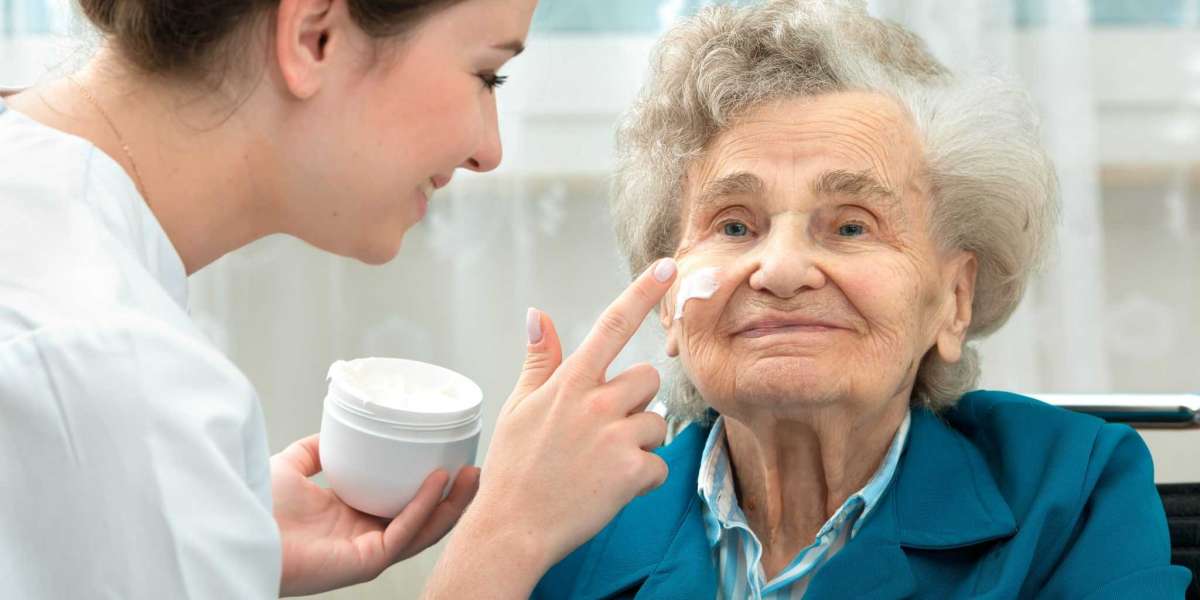Whatever our age, taking care of our skin - the largest organ in our body - can seem like a daunting task at times. Fortunately, there is help available. When the weather cools down and we turn the heat on, we suddenly find ourselves dealing with dryness, itchiness, and redness, just as we're getting ready to say goodbye to the season when everyone seems to be concerned about sunscreen application. However, while it is tempting to focus on how our skin is feeling on a particular day or during a particular season, the reality is that skincare is important all year long: we need to wear sunscreen in the winter, we need to moisturize our skin in the summer, and we always need to be on the lookout for any new developments in our skin.
Given the fact that our skin changes as we age, it is especially important for seniors to take care of and monitor their skin - but this can be a difficult task to accomplish. We've compiled a list of the top 10 tips to keep in mind when caring for the skin of senior citizens to assist both seniors and caregivers.
1. Cleanse with care.
A cleanser that "remove[s] dirt without stripping [their] skin of moisture," according to the AARP, is the best choice for seniors. Skin dryness is more common in older people, owing to "a reduction in skin cell turnover, as well as... a limited capacity to retain moisture," as well as a reduction in skin's elasticity, according to the National Institutes of Health. That's why it's so important for seniors to use skincare products that don't strip the skin of its naturally occurring oils.
The American Academy of Dermatology Association recommends that people cleanse their skin with warm water rather than hot water, pat their skin dry without removing all of the moisture, and avoid using bath brushes or puffs that could cause skin irritation.
2. Moisturize the skin.
Another important strategy for combating the dry skin that often occurs as a result of aging is to moisturize on a regular basis. Because fragrance can irritate skin, it is preferable to use a fragrance-free moisturizer. Seniors should aim to apply moisturizer within three minutes of washing their faces and/or bodies, as this will "restore [the] skin's protective barrier," according to the Skin Cancer Foundation.
Seniors may also benefit from the use of serums, retinol creams, and antioxidant creams, which provide additional hydration and skincare benefits. These products can help to even out the tone of one's skin and/or remove dark spots from one's complexion. The American Association of Retired Persons (AARP) provides specific recommendations for products that are most beneficial for the skin of people in their fifties, sixties, and seventies.
3. Protect yourself from the sun.
Moreover, this is true not only in the summer or when planning to spend the entire day outside, but all year round. One of the most effective ways for seniors to protect the health of their skin is to develop the habit of applying sunscreen on a regular basis. Keep in mind that ultraviolet rays can pass through cloud cover and through windows! The National Institute on Aging (NIA) recommends that seniors use a sunscreen with an SPF of at least 30 and a "broad spectrum." The National Institute on Aging (NIA) also recommends that seniors avoid spending excessive time outside during the sunniest hours of the day (between ten in the morning and four in the afternoon), and that they protect their skin by wearing hats, long sleeves, and long pants or skirts during those hours.
4. Take note of your skin's condition.
Every month, seniors - or their family members or caregivers - should check their skin for signs of skin cancer, paying particular attention to birthmarks and moles. The National Institute of Allergy and Infectious Diseases (NIA) has a helpful chart outlining the 'ABCDEs' that are important to remember while performing this check. If any of these changes are observed, it is critical that you consult with a physician. Checking in on the skin can also entail noticing any red, dry, or irritated patches, which can be reported to a doctor, who may be able to recommend treatments. It's also important to look at the skin on the bottoms of seniors' feet. Growing older means that our feet become more susceptible to corns, callus, warts, and fungal infections because of the skin on our feet becoming more porous. Seniors and/or their caregivers should be on the lookout for all of these signs and symptoms, and they should remember to include their feet in their monthly skin examinations.
5. Take care of your hands.
Seniors should always wear gloves when using chemical cleaners, submerging their hands in hot water (while washing dishes, for example), or engaging in activities such as gardening where their skin may be nicked by tools or thorns, to protect their skin from infection. Gloves help to prevent injury, irritation, dryness, and excessive sun exposure, all of which can have a negative impact on one's skin and should be worn whenever it is possible. Because the skin on our hands is frequently subjected to more abuse than the skin on other parts of our bodies, it is critical to protect it whenever feasible. This is especially important as we grow older because our skin becomes thinner as we age, making it more delicate and susceptible to injury as a result.
6. Make an effort to avoid bruising on the skin.
When we reach our sixties, our skin not only bruises more easily, but it also takes longer to recover from the injury. Aside from that, some illnesses can make skin more susceptible to bruising, and bruising more easily can be a side effect of certain medications as well. Seniors (or their caregivers) who notice an increase in the amount of bruising on their skin should consult their doctors because bruising can be an indication of medical problems.
7. Drink plenty of water.
One way to combat dry skin, according to the National Institutes of Health (NIA), is to drink plenty of water. A 2015 study concluded that "increased water inputs in the regular diet might positively impact normal skin physiology." Adequate hydration has numerous health benefits for our bodies, and it also has numerous health benefits for our skin. Seniors can help their skin's level of hydration improve from the inside out by drinking plenty of water on a daily basis and applying moisturizer on top of that.
8. Maintain a healthy diet.
In an interview with Good Housekeeping magazine, a dermatologist shared his thoughts on the importance of eating healthy, balanced meals for our skin. Skin moisture is maintained, according to the dermatologist, by the consumption of omega-3 fatty acids. Including foods such as walnuts and flax seeds in seniors' diets can help them get the nutrients they need. An additional recommendation was a common one that we all know is beneficial to our bodies in a variety of ways: eat more vegetables!
9. Give up smoking.
Despite the fact that we don't typically think of our skin as an organ that is affected by smoking, it is. Apart from the fact that smoking has negative aesthetic consequences for our skin, such as accelerated aging and wrinkling, it also has the additional effect of reducing skin's elasticity - something that occurs naturally as we age, as previously mentioned. According to the Mayo Clinic, smoking increases one's risk of developing skin cancer by a factor of two. Choosing to live a smoke-free lifestyle is beneficial to our health in a variety of ways, including the condition of our skin.
10. Make an appointment with a dermatologist.
Seniors and/or their caregivers should check their skin on a monthly basis, and they should also visit a dermatologist once a year to discuss any skincare questions or concerns they may have. This is particularly important because our risk of developing melanoma increases with age - according to the American Cancer Society, the average age at which a melanoma diagnosis is made is sixty-five - and sun exposure increases with age. The ability to identify issues or abnormalities on one's skin is one of the many services provided by dermatologists. They can also recommend skincare products, prescribe medicated creams or ointments, and provide advice to seniors on how to best care for their skin and spot irregularities.



